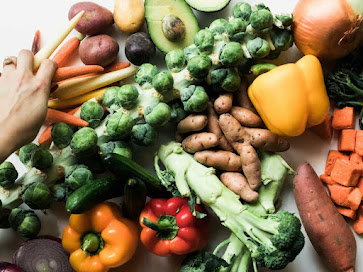8 Surprising Vegetables That Are Sneakily Packed With Plant Based Protein
First, why does it matter? Plant-based protein has been shown to improve satiety levels after meals, which means you’ll be more likely to feel full and less likely to give in to snacks later on. Second, plant-based protein can help you lose weight because it takes longer to digest, which means you’ll stay fuller longer and eat less during the day!
Broccoli
At only 7 grams of protein per 100g, broccoli is not one of
our top picks for vegetables that contain lots of protein. However, it still
contains a decent amount and is definitely worth incorporating into your diet
if you’re trying to eat more plant based foods. The broccoli family (broccoli,
cauliflower and cabbage) are related but they don’t all contain a large amount
of protein; cauliflower and cabbage have less than 1 gram of protein per 100g.
Still not very high in terms of total proteins but worth eating if you’re
trying to eat more plant based foods. At only 7 grams of protein per 100g,
broccoli is not one of our top picks for vegetables that contain lots of
protein.
Mushrooms
You already know that spinach, tofu and quinoa are great
sources of plant-based protein. But did you know mushrooms are, too? A 3-ounce
serving of cooked mushrooms contains about 6 grams of protein. Keep your eyes
peeled for cremini and shiitake varieties— they’re two of my favorites. Try
them in a stir fry or as a topping on salads, omelets and more. 1 cup = 7g
protein (16% DV)
Kale
If you’re looking for a few different ways to sneak more
plant-based protein into your diet, then consider adding more leafy greens to
your menu. For example, one cup of cooked kale has 2 grams of protein. When
cooking kale, be sure to remove any tough stems that could make it hard to
chew, and pair it with another flavorful food like onions or garlic. You can
also eat it raw—just make sure it’s chopped finely so that you get all of its
nutrition benefits! There are endless ways to include kale in your diet; don’t
forget about these 20 tips on how to use kale. To lose weight safely but
quickly , incorporate kale (and other leafy greens) into as many meals as
possible throughout the day.
Spinach
You’ve probably had your fill of Popeye jokes, but he was
onto something with spinach. A medium-sized cup (about 6 ounces) of cooked
spinach has 7 grams of protein. The body also can't absorb all that much iron
from leafy greens, and spinach contains oxalic acid, which limits its
absorption even further. Spinach is also high in magnesium and potassium. For
example, a cup (6 ounces) provides more than 60 percent of your daily
requirement for magnesium and almost 30 percent for potassium.
Asparagus
1 cup of cooked asparagus has 8.5 grams of protein! It is a
good source of folate, vitamin K, thiamin and vitamin B6. Asparagus is an
excellent source of vitamin C and a very good source of dietary fiber,
manganese, and potassium. Due to its high concentrations of glutathione
asparagus may reduce your risk for certain types of cancer like colon and
breast cancers! Yum! Here are three different recipes you can make with
asparagus: Spicy Lemon Shrimp Stuffed Asparagus Lemon Garlic Chicken &
Bacon Stuffed Roasted Asparagus Here's another list you should read about
healthy foods that will help you lose weight.
Pumpkin Seeds
Pumpkin seeds are often viewed as a treat because of their
rich, buttery flavor, but they’re actually great for our health. They’re loaded
with unsaturated fats and protein. Additionally, pumpkin seeds are low in
calories and contain about 50% more magnesium than most other seeds. Magnesium
is a crucial nutrient for almost all biological processes; it also helps
prevent and fight migraines and constipation. Just one ounce of pumpkin seeds
contains six grams of protein! Additionally, pumpkin seeds are extremely easy
to incorporate into your diet—you can add them to stir-fries or sprinkle them
on top of salads or yogurt! Pumpkin seed butter is also a great substitute for
peanut butter!
Cauliflower
Touted as one of 2015’s superfoods, cauliflower is
definitely a nutrient-dense veggie. The white-headed wonder can be eaten raw in
salads, steamed or stir-fried to boost your intake of vitamin C and K, folate
and potassium. It can also be processed into rice to substitute for carb-heavy
foods like brown rice or quinoa, or used as a pizza crust. The good news: One
cup of raw cauliflower contains 19 calories—so you can eat till your heart’s
content without worrying about gaining weight!
Green Peas
Peas are packed with plant-based protein, but they also
contain fiber and some vitamins. A cup of green peas contains around 8 grams of
protein, along with 26 other essential nutrients that are good for your overall
health. Peas make a great substitute for meat and can be easily added to salads
or used as a topping on soups. If you’re trying to cut down on your meat
intake, try cooking up some pea soup or adding peas to a stir fry. You’ll be
getting plenty of plant-based protein without even thinking about it!





















